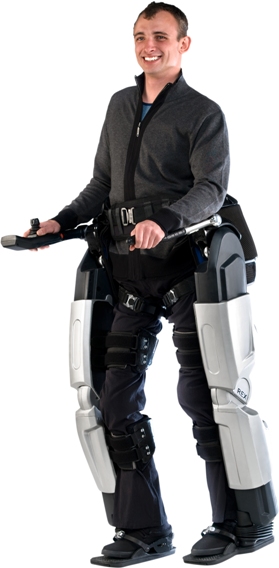World first robotic legs provide new option for wheelchair users
 When Hayden Allen was spinal cord injured five years ago he became a full time wheelchair user and doctors told him he’d never walk again. Today a revolutionary product developed by Auckland-based company Rex Bionics has enabled Hayden to walk again.
When Hayden Allen was spinal cord injured five years ago he became a full time wheelchair user and doctors told him he’d never walk again. Today a revolutionary product developed by Auckland-based company Rex Bionics has enabled Hayden to walk again.
Hayden has been one of the first people in the world to use Rex, the Robotic Exoskeleton. Rex is best described as a pair of robotic legs that supports and assists a person who usually uses a wheelchair, enabling the person to stand, walk and go up and down steps and slopes.
“I’ll never forget what it was like to see my feet walking under me the first time I used Rex,”says Hayden, who is 6’4” (193cm) tall when standing. “People say to me, “look up when you’re walking” but I just can’t stop staring down at my feet moving.”
Being out of his chair and on his feet again allows Hayden many more options on a day to day basis, increasing opportunities for employment and recreational activities by providing access for him to independently go places previously inaccessible to him. For example – up stairs!
Rex users self-transfer from their wheelchair into Rex, strap themselves in and control their movements using a joystick and control pad.
Rex is the brainchild of two childhood friends, Richard Little and Robert Irving – co-founders of Rex Bionics. “Both of our mothers are in wheelchairs so we are aware of some of the obstacles and access issues faced by many wheelchair users,” says Richard.
Robert’s Multiple Sclerosis diagnosis seven years ago was the catalyst for these men to put their engineering skills to use to develop a practical, standing and walking alternative to wheelchairs.
The founders are quick to point out that Rex is not a replacement for a wheelchair, but a complement that offers a range of options not currently available anywhere else in the world. It is potentially suitable for manual wheelchair users who can self-transfer and operate hand controls.
Dr Richard Roxburgh, Auckland Neurologist and Medical Adviser to the Muscular Dystrophy Association says, “For many of my patients Rex represents the first time they’ve been able to stand up and walk for years. There are obvious immediate benefits in terms of mobility, improved social interaction and self-image. There are also likely to be major long term health and quality of life benefits through reducing the complications of being in a wheelchair all the time.
“I think that this will also enable people to stay well longer; this means that those who have conditions where disease modifying treatments are coming over the next five to ten years, will be in better shape when those treatments finally arrive.”
Each Rex is built onsite at the Rex Bionics’ Auckland plant. It has been designed to be practical, lightweight, portable, safe, simple to use and sufficiently powered for a typical day of use thanks to a long-life rechargeable battery.
Potential customers must complete a medical appraisal including checks with their own physician to ensure their general health and suitability before they can begin the process of fitting and training. This process typically takes around two weeks with Rex Bionics’ team of technicians, based at the Rex Centre in Auckland.
Rex has undergone thorough testing during its seven year development including engineering validation and clinical trials, with the approval of the New Zealand Ethics Committee, in conjunction with disability and rehabilitation advisors.
Rex is expected to cost approximately US$150,000. The decision to purchase Rex will be a very individual assessment of what Rex allows customers to do. The benefits can be social, for the work place, for home and health related.
Rex will soon be available for purchase in New Zealand, where the price will be a bit lower since it will be easier to supply and support close to the company’s home base on Auckland’s North Shore.
CEO of Rex Bionics, Jenny Morel, says they expect to conclude internal testing of Rex shortly and will then have a preliminary release in Auckland to allow the company to track what happens when people take Rex home. Sales are expected to commence in New Zealand by the end of 2010 and elsewhere in the world by the middle of 2011.
Rex has been developed with the support of TechNZ and venture capital company, No 8 Ventures.



